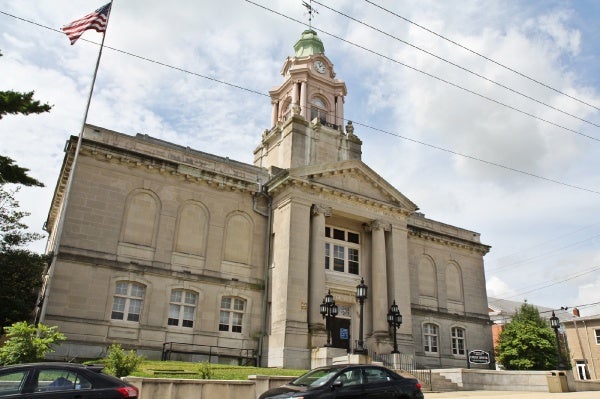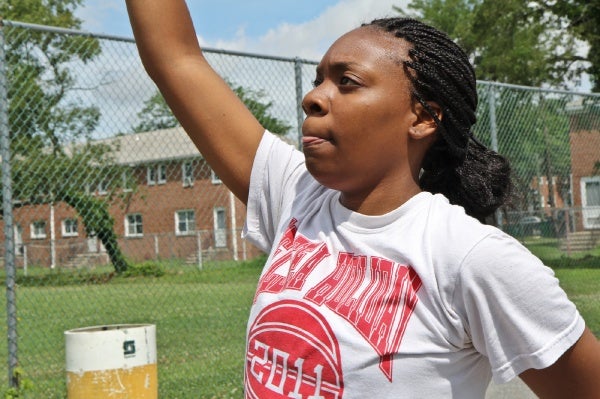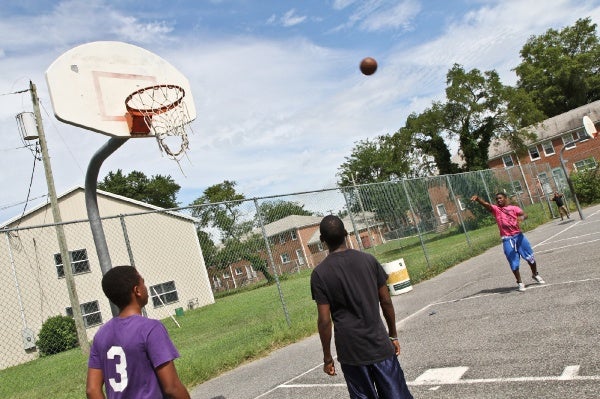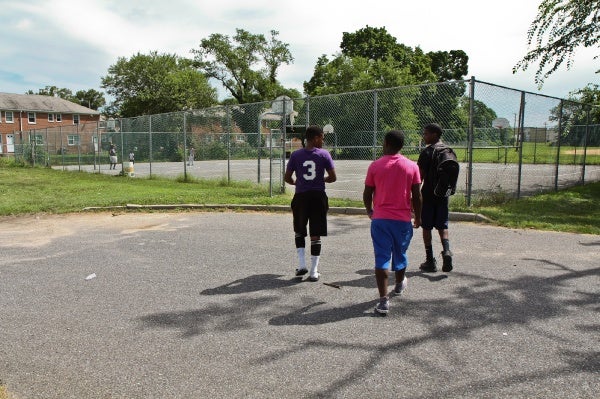How one man used drive, tragedy and hoops to counter Bridgeton’s gang influence
It’s a Thursday night in Bridgeton, N.J., and John Fuqua is standing smack-dab in the middle of rival gang members in the midst of heated battle.
The men surround him, gritting teeth and posturing hardened looks past him at their opponents.
Fuqua — thickly-muscled, but shorter than many of the men — keeps his composure. The calm look of experience rests in his eyes. The other men leak sweat in the tension of the moment, but Fuqua’s brow stays dry.
He’s been here a million times before.
He holds a whistle to his lips and, at his prompt, fury is unleashed. The grunts and screams of competition echo in the hall.
They’re fighting not over territory or drugs. Instead — just as Fuqua, 36, would have it — they’re fighting over a basketball.
Conflicting visions of Bridgeton
Bridgeton is a patch of town nestled in the Cumberland County flatlands not far from the coast of Delaware Bay. Some 25,000 residents reside within its six square-mile borders.
On the one hand, it boasts having the largest historic district in New Jersey, with thousands of Victorian-era homes in the national Register of Historic Places. On the other, after years of post-industrial decline, it’s also become known as a hotbed of gang activity.
A 2010 report by the New Jersey State Police found that Bridgeton — though very much a rural area — has one of the highest rates of gang participation per-capita in the state.
The numbers said that 2.3 percent of Bridgeton’s population was known to be gang affiliated. That rate is higher than Newark and Trenton; it’s second only to Camden.
For many of Bridgeton’s youths, gang-affiliation starts early and rages often. It’s become commonplace for fifth- and sixth-graders to think of gangs in the way most kids think of high-school: An inescapable inevitability.
John Fuqua’s mission has been to give the kids an escape. A major part of that effort has been the basketball leagues he runs by cobbling together an assortment of sponsors.
About 100 kids come to play organized games twice a week. And yes, Fuqua says, many of them already have rival-gang affiliations, but when they come to his league, their only allegiance is to each other.
“A lot of those kids want to do something different. It’s about giving them opportunities,” said Fuqua. “For a lot of them, the gangs are right there outside their front door. For a lot of them, it’s right in their own home. But if we open doors of facilities like this and we give them opportunities to be kids, then they’re gonna come play if they have that opportunity.”
The road less taken
As a teenager growing up in a Bridgeton housing project, when most everyone else he knew was dropping out of high school to join gangs, Fuqua dreamed of life beyond Cumberland County, so he committed himself to graduating.
“Just growing up in the house I grew up in, seeing my mom do crack 24 hours a day — until she became clean the last 14 years of her life — it’ll have a profound effect on a kid,” said Fuqua. “Seeing all four of my sisters come home pregnant before they were 16 years old leaves a scar on a kid, and makes you know what you don’t want to do.”
But he met hurdles to that goal everywhere, including amongst his own peers.
Fuqua says he was constantly challenged by the dropouts in the neighborhood when they saw him going to Bridgeton High; “You corny, why you going to school? You think you white?” they’d taunt.
“I’m darker than most people that live here,” says Fuqua, “but I was called ‘white’ because I was trying to go to school, because I was trying to get an education.”
Sometimes it wasn’t just name-calling. Fuqua remembers a half a dozen times when he had to physically fight people who were trying to prevent him from walking to school.
“The scrutiny that comes in the community where there’s nothing but failure and no opportunity,” he said, “you try and do something different, you gonna be challenged every step of the way.”
While much of the rest of his neighborhood got sucked into repping gang colors and flashing signs, the linebacker-sized Fuqua stayed out of trouble by immersing himself in not just school, but sports. Football. Basketball. Track.
Fuqua’s determination paid off. By the time he finished high school, based on both his academics and athletics, he punched his ticket out of Bridgeton by earning a partial scholarship to William Paterson University.
Hours away in North Jersey, he excelled. After graduating with a degree in English, he began to build a career as a social-services counselor.
By the early 2000s, he had a steady job and cozy place in Jersey City with a view of the Manhattan skyline.
Bridgeton, he figured, was buried in the past, and he had no intentions of ever going back.
Bridgeton came calling
A few years passed before Fuqua received the phone call that would forever change his life. It was a desperate plea from Rakeem Stubbs.
“My nephew called me in 2006 and asked me if he could come live with me in Jersey City because the gang problem in little Bridgeton, New Jersey was starting to be too much for him,” Fuqua recounted.
At first, Fuqua didn’t think it was a good idea. His apartment was too small and Jersey City had problems of its own. But when Rakeem persisted, Fuqua came up with what he thought was a better idea.
Instead of helping Rakeem get away from the bad in Bridgeton, Fuqua — now a grown man — would go back and do what he couldn’t do as a boy: make the town better.
By the time Fuqua returned in 2007, Bridgeton’s gang problem was even worse than he remembered, even from a personal perspective.
“My nephew was already signed up with a gang. He was already engulfed in gang activity,” Fuqua said. “He was incarcerated at Cumberland County detention center, because Rakeem had accumulated three assault charges in one year.”
Over the next year, once Rakeem got out of jail, Fuqua tried to convince him to take a more positive route, but nothing stuck.
Deaths at Christmas
Then, on Dec. 24, 2008, Rakeem was shot and killed in a gang-related robbery gone wrong.
Upon hearing about the shooting, many of Fuqua’s family members immediately rushed to the scene in separate cars, including Fuqua’s mother. She was a half a block from Rakeem’s dead body when she went into cardiac arrest.
“By the time I got up here, she was out of the car. People were trying to do CPR on her,” Fuqua said. “I stepped in, checked her pulse and started administering CPR on my mother for around eight or nine minutes.”
But, he couldn’t revive her.
“I lost my mother and I feel like I failed her with my hands because I couldn’t even keep her alive,” Fuqua said.
Before the clock rang midnight on Christmas Day, Fuqua’s family was two members smaller.
The nephew he came back to save had been gunned down. The only parent he had ever known lay breathless on the frigid Bridgeton roadside.
At a crossroads
In the days following the deaths, Fuqua says many members of his extended family called for retaliation.
“I got people in my family that are gang members, gang affiliated and they’re really in it,” he said. “I’m not involved in no gang, but my voice said, ‘No.'”
Fuqua blamed the plague of violence that had shrouded his city on the lack of alternatives for Bridgeton’s youth.
Instead of retribution, Fuqua doubled down on positivity. He turned to the thing that had been his savior as a kid: Organized sports.
“I found five kids, went to those five kids and gave them a task,” he explained of a mission’s starting point. “They all had to go get three kids to come sign up for basketball. That group of kids came back and they had to go get two, three kids to sign up for basketball,” said Fuqua. “That was their fee, to play basketball you had to bring three other kids. You had to be a referral source.”
‘Something like a dad’
Six years after his Bridgeton return, Fuqua’s basketball program has been making a real difference in kids’ lives.
“He’s always around,” said 16-year-old Sadaiah Robbins of Fuqua. “He gives you good advice. Something like a dad.”
Now an honor roll student, Robbins hopes to one day become a doctor, lawyer or athletic director. But just a few years ago, she was on a much different track.
“I mean I was hanging out. I was outside at like 11 o’clock. I would fight. I would help the kids jump other people,” Robbins recounted. “We see a kid walking down the street, we would hit them. I don’t know why. We just did it.”
Robbins calls Fuqua by the nickname most of the kids know him by: “John Willy.”
“When I met John Willy, he turned my life around,” she said. “He got me into basketball. He got me into good things at school.”
Offering hope
Just like Fuqua before him, eighth grader Tavaius Wilson feels trapped by the lack of opportunity in Bridgeton.
“Little kids, around my age or whatever, they starting to make their own gangs and getting more into it, and they starting to bring the violence into schools,” said Wilson.
But it’s Fuqua’s league — and his story — that gives him the hope that he, too, can rise above the troubles of the town.
“I see him as a good friend to me, someone I can come talk to,” he said. “If I got any problems or if I need any help with anything, I feel as though he’ll be there to help me.”
It’s not just the kids who’ve noticed Fuqua’s efforts. Bridgeton Mayor Albert Kelly values him as a key on-the-ground resource in the city’s overall fight against gang culture.
But to Fuqua, it’s not about the recognition. It’s about saving other families from the pain that he felt when he lost his mother and nephew in 2008, a pain that he says “wakes him up every single morning” and drives him to stick with the town he once worked so hard to get away from.
“I just want to be consistent. I want the kids to know that these leagues are going to be here every single year,” Fuqua said. “They’re going to have jerseys. They’re going to get trophies. We going to have fun.
“They gonna laugh, and the thing about it is, when these kids leave here they can know that [if] they can get along on the basketball court, they can get along in this community. You don’t gotta live up to no facade. You don’t got to be repping nothing. I want you to be a kid.”
WHYY is your source for fact-based, in-depth journalism and information. As a nonprofit organization, we rely on financial support from readers like you. Please give today.









